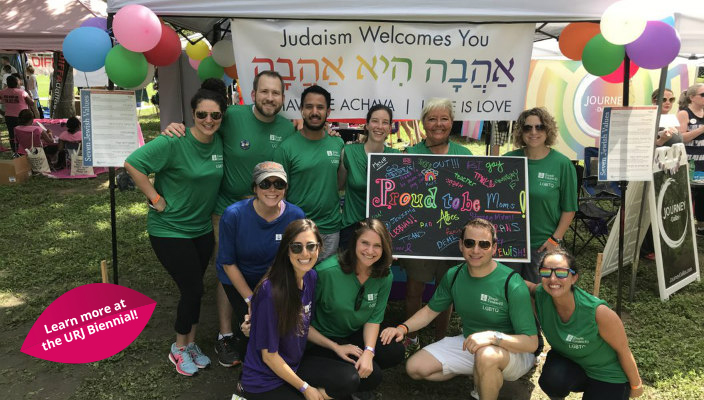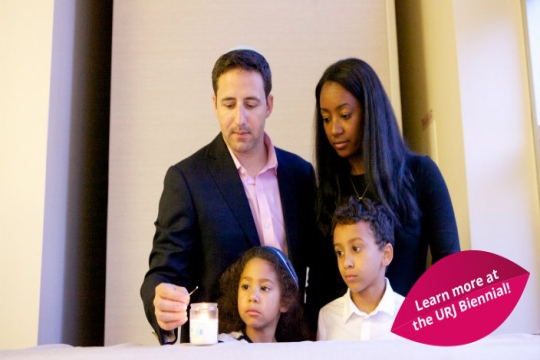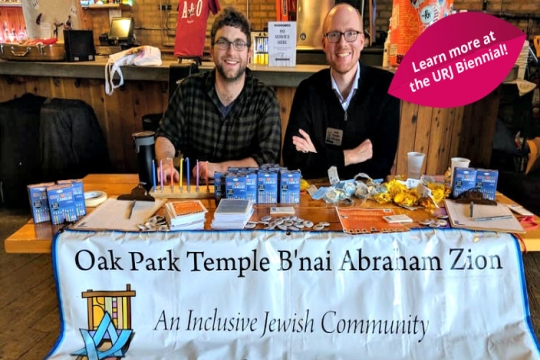
In 2015, the Union for Reform Judaism adopted the “Resolution on the Rights of Transgender and Gender Non-Conforming People,” a declaration of the Reform community’s commitment to the full equality and inclusion of people of all gender identities and gender expressions. Temple Emanu-El in Dallas, TX, decided to implement this value in its Gender Identity Training program, which won the congregation a 2019 Belin Award.
The Reform Movement’s commitment, along with that of Temple Emanu El, is based in the Jewish value that we are all created in God’s image, and our different gender identities deserve to be acknowledged, respected, and affirmed in all areas of Jewish life.
“Temple Emanu-El has always been an open, welcoming community, and one of the first synagogues in the south to officiate same-sex marriages,” Rabbi Utley says. “We felt like we wanted to continue being at the forefront as much as possible.”
In that vein, the focus of Temple Emanu-El’s Gender Identity Training program is twofold.
- Training for the synagogue’s leadership, clergy, and school faculty about inclusive language; connecting Jewish values relating to gender and gender identity; and pastoral care for transgender individuals
- Offering education for Jewish communal leaders throughout the broader Dallas Jewish community on gender identity; how to better affirm trans and queer-identifying people in the community; and the necessity to continue the conversation around gender identity and allyship training
The initiative began after a temple staff member attended the URJ Biennial in 2017 and learned about an outreach program to the trans community led by Temple Israel in Bloomfield Hills, MI. This, in turn, inspired Temple Emanu-El’s Rabbi Dan Utley to do something similar.
The training took several steps, including both physical changes, staff and clergy training, and parent education courses. After changing the synagogue’s bathroom configurations to have all-gender bathrooms with brand-new signage, Rabbi Utley and program co-leader Erika Purdy-Patrick received a grant from the Jewish Federation of Greater Dallas to bring in Keshet to facilitate trainings with a wide range of Emanu-El staff.
Keshet’s trainings covered topics such as the difference between sex and gender; LGBTQ+ terminology; and inclusive language for congregational staff’s phone conversations with members and prospective members.
The trainings also provided Emanu-El staff with the knowledge to make the congregation’s membership applications more inclusive of all gender identities and expressions, which, Purdy-Patrick says, “sends the signal to people that Emanu-El is ready to welcome them, no matter who they are and what their experience is.”
Afterward, Purdy-Patrick and Rabbi Utley brought in an Emanu-El community member – a social worker who identifies as transgender – to provide additional gender identity training for clergy and religious school staff and faculty, equipping them to have conversations with children to explore their gender identities. The training also equipped them to have conversations with Temple Emanu-El families, allowing them to engage in conversation.
This led to parent education courses led by Emanu-El’s youth learning and engagement team and facilitated by a local LGBTQ social worker and therapist.
“It was really eye opening for the parents,” Purdy-Patrick recalls. “It made us realize that this is an ongoing conversation; it’s something that will continue to happen regularly at Temple Emanu-El because there’s a thirst for it, especially from the parents.”
Rabbi Utley agrees. He says:
“This has opened the door to talk about different aspects of individual identity and lived experience that go beyond just LGBTQ+ identities and transcend into the identities and experiences of Jews of Color, conversion students, etc. which has sparked some broader conversations in the community. Temple Emanu-El is a place that always thought of itself as being on the forefront of social justice, equality and inclusion in the community, and this opened the door for us to have more heart-opening conversations about where we’re holding prejudice and don’t realize it.”
When asked about the impact these trainings have had on the community, Purdy-Patrick shares the story of a transgender teenager who had been involved with the synagogue since preschool.
“Shortly after his bat mitzvah ceremony, he stopped attending temple activities as he began exploring different gender expressions,” she says. “His mother was nervous about how this might change her relationships within the larger Temple Emanu-El community, and so she withdrew from temple, as well.”
After learning about the gender identity learning sessions in the synagogue’s monthly newsletter, The Window, the teen’s mother came in to speak with Purdy-Patrick and Utley, which led to her taking the training and reengaging with the community – along with her son.
“This act of audacious hospitality led to her son feeling that he could return to temple as the person he truly is – a happy, thriving teenage boy who wants to teach the world more about gender identity,” Purdy-Patrick says.
Acts like this are only the beginning. Temple Emanu-El has more planned for the future, including follow-up trainings and refresher classes for their Early Childhood, Youth, and general staff and board members, as well as initiatives to empower their LGBTQ+ teens lead the way to a more diverse, inclusive, and equitable community. As for how other congregations can follow Emanu-El’s path, Purdy-Patrick suggests it’s as easy as looking inward:
“Look at who in your community has these talents and these outsets,” she says. “Do you have clinical therapists or educators who are trained in gender identity or are familiar and knowledgeable about common obstacles faced by the LGBTQ+ community?
“If so, see if they’re willing to lead a training. There’s a really good chance that you’ve got someone in your congregation who’s waiting to become a lay leader and maybe this is their pathway in.
“This work takes a lot of small steps and community building, it’s a lot of hands-on education and awareness. I think gender identity work within Reform Judaism is kind of in a pioneering phase to a degree, so there’s a lot of pioneering and experimenting involved, which sometimes can feel scary – but how else will you make progress?”
To learn more about how your congregation can implement similar trainings, reach out to Erika Purdy-Patrick at and Rabbi Dan Utley.
Posters about each award-winning project will be on display at the URJ Biennial, the largest Jewish gathering in North America, held December 11-15, 2019, in Chicago, IL. Register now to join thousands of Jews from around the world to learn, pray, share ideas, dance and sing, hear from inspiring speakers, reunite with old friends, create new connections, and more.
Have something to say about this post? Join the conversation in The Tent, the communications and collaboration platform for congregational leaders of the Reform Movement. You can also tweet us or tell us how you feel on Facebook.
Related Posts

Meet This Year's Belin Award-Winning Congregations

How One Synagogue Honored Loved Ones Lost – and Found Community Anew
